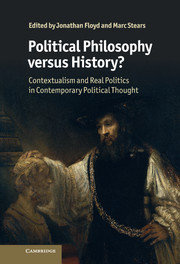 Political Philosophy versus History?
Political Philosophy versus History? Book contents
- Frontmatter
- Contents
- Note on the contributors
- Acknowledgements
- Introduction
- Part I The challenge of contextualism
- Part II The challenge of realism
- 5 Politics, political theory and its history
- 6 Constraint, freedom, and exemplar: history and theory without teleology
- 7 History and reality : idealist pathologies and ‘Harvard School’ remedies
- 8 The new realism : from modus vivendi to justice
- Relative value and assorted historical lessons : an afterword
- Index
- References
6 - Constraint, freedom, and exemplar: history and theory without teleology
from Part II - The challenge of realism
Published online by Cambridge University Press: 05 June 2012
- Frontmatter
- Contents
- Note on the contributors
- Acknowledgements
- Introduction
- Part I The challenge of contextualism
- Part II The challenge of realism
- 5 Politics, political theory and its history
- 6 Constraint, freedom, and exemplar: history and theory without teleology
- 7 History and reality : idealist pathologies and ‘Harvard School’ remedies
- 8 The new realism : from modus vivendi to justice
- Relative value and assorted historical lessons : an afterword
- Index
- References
Summary
Reading the newspaper early in the morning is a kind of realistic morning blessing.
(Hegel, Jena journal, published as ‘Aphorismen aus Hegels Wastebook’)… the introduction of the parliamentary imbecility, including the obligation upon everyone to read his newspaper at breakfast.
(Nietzsche, Beyond Good and Evil, Part VI, § 208)Is reading about historical events a blessing or a curse, or even an imbecility? Is it the royal road to political understanding, or a dark and damning diversion from true political principles? Plato invented the new genre of philosophical dialogue a little later than, and in distinction from, Thucydides’s invention of the new genre of contemporary historical reconstruction, yet for the inheritors of both, such as Plutarch, and those who read him, such as Rousseau, to reflect on the history of classical Athens and later Rome was an indispensable part of the emerging tradition of political theorising. It is only in light of certain developments, themselves historical, that the significance of history for normative political theory can even be put into question. Those developments have led to a state in which – to caricature, for the sake of emphasis – some theorists read Machiavelli and Hobbes, without feeling it essential to read their own sources such as Thucydides, Livy, Sallust, and Plutarch, while others dispense with all these prior writers in practising a pure theoretical construction or analysis.
- Type
- Chapter
- Information
- Political Philosophy versus History?Contextualism and Real Politics in Contemporary Political Thought, pp. 128 - 150Publisher: Cambridge University PressPrint publication year: 2011
References
- 4
- Cited by


